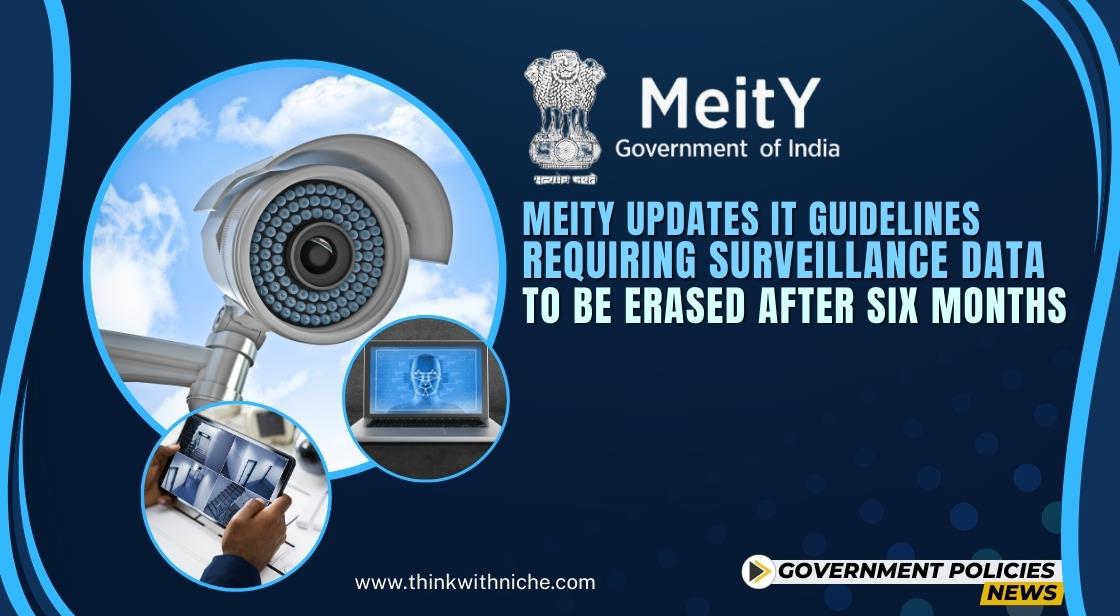MeitY updates IT guidelines, requiring surveillance data to be erased after six months

News Synopsis
According to a February 26 gazette notification, the Ministry of Electronics and Information Technology (MeitY) has proposed amendments to the Information Technology (Procedure and Safeguards for Interception, Monitoring and Decryption of Information) Rules, giving the Union and state home secretaries the power to order the removal of surveillance data after six months.
Previously, the security agency in charge of the surveillance, whether authorized by the home ministry or a competent court, was the only entity with the authority to remove surveillance recordings. The authorized home secretaries now have the authority to order deletions thanks to a recent modification that was announced by the IT Ministry.
The former policy, which restricted this ability to certain security organizations like the National Investigation Agency, Intelligence Bureau, and Narcotics Control Bureau, is no longer in place due to this noteworthy shift.
Key Changes:
- Empowering Home Secretaries: Previously, only specific security agencies, like the Intelligence Bureau and National Investigation Agency, held the authority to delete surveillance data. The amended rules now designate Union and state home secretaries as competent authorities empowered to issue deletion orders after a period of six months. This shift aims to centralize control and enhance transparency.
- Clarity and Technical Enhancements: MeitY officials emphasize the amendments' role in providing clarity and technical enhancements to the existing framework. By explicitly defining home secretaries as "competent authorities," the amendments aim to simplify procedures and improve efficiency in handling data deletion requests.
- NIA Designation: Additionally, MeitY designated the computer resources of the National Investigation Agency (NIA) as "critical information infrastructure" under the IT Act 2000. This classification signifies the importance of protecting NIA's IT infrastructure from potential cyber threats.
Centralized Control and Streamlined Procedures
The amendments introduced by MeitY mark a significant shift in the management of surveillance data in India. The designation of home secretaries as competent authorities centralizes the control of data deletion and streamlines the process by removing the need for individual requests to specific agencies.
Enhanced Transparency and Accountability
This change is expected to enhance transparency and accountability in surveillance practices. By establishing a clear chain of command, the amendments aim to ensure that data deletion requests are handled efficiently and in accordance with established regulations.
Clarification and Technical Improvements
MeitY officials emphasize the technical improvements brought forth by the amendments. By explicitly defining roles and responsibilities, the amendments aim to minimize ambiguity and improve the overall efficiency of data management procedures.
Securing Critical Information Infrastructure
The additional designation of the NIA's computer resources as "critical information infrastructure" highlights the government's commitment to protecting sensitive data from potential cyber threats. This classification reflects the importance of safeguarding the NIA's IT systems in ensuring national security.
Conclusion
The amendments introduced by MeitY represent a multifaceted approach to strengthening the management of surveillance data in India. By empowering home secretaries, enhancing transparency, and improving technical frameworks, these changes aim to strike a balance between national security concerns and the need for individual privacy. While the long-term implications of these amendments remain to be seen, they mark a significant step towards establishing a more accountable and streamlined system for handling surveillance data in India.
You May Like









